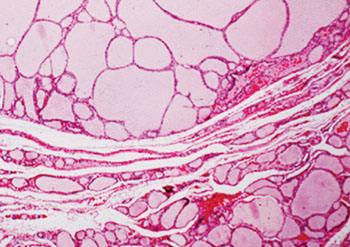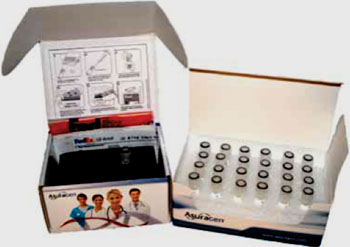Genetic Mutation Test Improves Definitive Diagnosis of Thyroid Nodules
By LabMedica International staff writers
Posted on 04 Jun 2015
Cytopathology on ultrasound-guided fine needle aspiration biopsies has dramatically improved the clinical management of patients with solid thyroid nodules that are greater than one centimeter. Posted on 04 Jun 2015
Molecular testing for oncogenic mutations or gene expression in fine-needle aspirations (FNA) from thyroid nodules with indeterminate cytology identified a subset of benign or malignant lesions with high predictive value.
Several scientists working at various institutions including Jersey Shore University Medical Center (Neptune City, NJ, USA) evaluated a novel diagnostic algorithm combining mutation detection and micro-ribonucleic acid (miRNA) expression to improve the diagnostic yield of molecular cytology. The teams tested 638 surgical specimens and preoperative FNAs for 17 validated gene alterations using a commercial thyroid test and with a 10-miRNA gene expression classifier generating positive (malignant) or negative (benign) results. Qualitative molecular results were compared to surgical histopathology to determine diagnostic performance and model clinical impact.
The miRInform Thyroid test (Asuragen Inc.; Austin, TX, USA) detected mutations in 69% of nodules with malignant outcome. Among mutation-negative specimens, miRNA testing correctly identified 64% of malignant cases and 98% of benign cases. The diagnostic sensitivity and specificity of the combined algorithm was 89% and 85%, respectively. At 32% cancer prevalence, 61% of the molecular results were benign with a negative predictive value of 94%. Independently of variations in cancer prevalence, the test increased the yield of true benign results by 65% relative to messenger (mRNA)-based gene expression classification and decreased the rate of avoidable diagnostic surgeries by 69%.
The authors including those from Asuragen, Inc., concluded that multiplatform testing for DNA, mRNA and miRNA can accurately classify benign and malignant thyroid nodules, increase the diagnostic yield of molecular cytology, and further improve the preoperative risk-based management of benign nodules. The study was published on May 12, 2015, in the Journal of Clinical Endocrinology & Metabolism.
Related Links:
Jersey Shore University Medical Center
Asuragen Inc.















